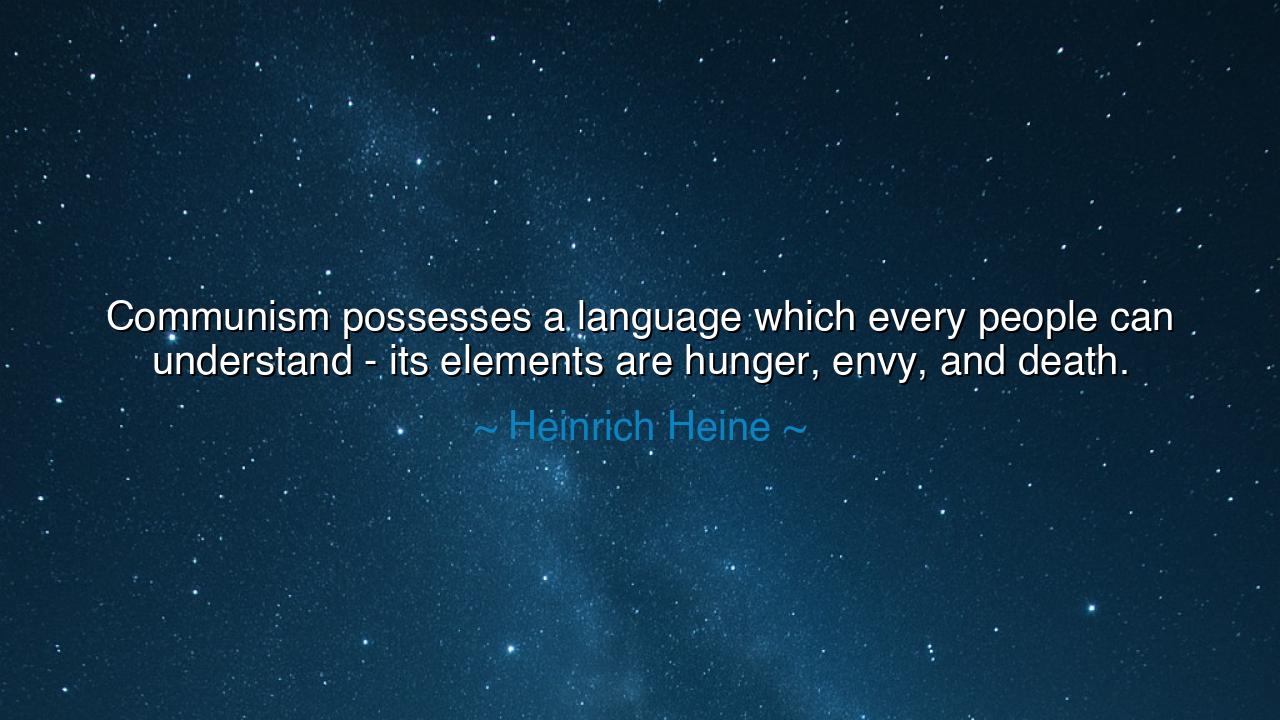
Communism possesses a language which every people can understand
Communism possesses a language which every people can understand - its elements are hunger, envy, and death.






"Communism possesses a language which every people can understand – its elements are hunger, envy, and death." Thus wrote Heinrich Heine, the poet and prophet of Europe’s troubled conscience, a man whose pen foresaw the storms of the modern world long before they broke upon the nations. His words are not the cry of hatred, but the lament of one who understood the depths of human passion and despair. In this sentence, Heine unveils the terrible simplicity of revolutionary fire—how suffering, when left unhealed, can become a language spoken by all, a force that transcends borders, reason, and mercy. His quote is both an observation and a warning: that the hunger of the body, the envy of the heart, and the death of the soul can unite humanity more swiftly than love, wisdom, or peace.
To understand this saying, one must remember the age in which Heine lived. The early nineteenth century was a time of upheaval—Europe trembled under the aftershocks of the French Revolution, and the rising tide of industrialization was forging vast empires of wealth and poverty. Heine, a poet born in Germany but exiled to France, stood at the crossroads of these worlds. He saw the poor of the cities starving beside the golden palaces of the rich; he saw nations divided between masters and laborers, faith and reason, freedom and control. Out of this chasm of inequality arose new ideas—among them, Communism, which promised deliverance through equality, but at the cost of fire and blood. Heine, with the foresight of a seer, recognized both its power and its peril.
When he spoke of “a language every people can understand,” he meant that desperation knows no dialect. The starving worker in Berlin, the peasant in Moscow, the miner in Wales—all comprehend the same cry of need. When hunger gnaws at the belly, it speaks louder than any sermon or law. When envy festers, it drives men to rage against those who seem to possess what they cannot have. And when death comes—whether by famine, by war, or by the destruction that ideologies unleash—it becomes the final word in a dialogue written in blood. Heine saw in Communism not merely an idea, but a universal grammar of despair—a revolution that feeds on the very emotions that humanity cannot escape.
Yet, his words were not an attack on the poor, but a warning to the powerful. For Heine knew that when injustice festers, revolution is not born from malice, but from necessity. Those who starve will rise, those who are humiliated will revolt. He saw clearly that the language of hunger, envy, and death becomes fluent in a world that refuses compassion. It is not Communism alone that speaks in this tongue—it is every ideology that forgets the soul of man, that treats him as a tool, a number, a machine. Heine’s wisdom is timeless because it does not condemn a system; it condemns the failure of humanity to nourish both body and spirit.
History would later prove his prophecy true. More than half a century after his death, the world would witness the rise of Lenin’s revolution in Russia. The starving peasants and the weary soldiers rose in a wave of fury and hope. The rulers of the old world fell, but the new order soon spoke the same dark language Heine had foretold. Hunger remained, envy turned to vengeance, and death became a constant companion. The ideal of equality, though noble, was consumed by the very emotions that had birthed it. In this, Heine’s insight revealed its tragic depth: that unless justice is tempered by wisdom and mercy, even the most righteous dream can decay into tyranny.
And yet, there is light in Heine’s warning. For if hunger and envy can unite mankind in destruction, then compassion and understanding can unite it in creation. His words call not for despair, but for vigilance. The cure for the language of suffering is not silence—it is dialogue. It is the duty of every generation to speak a better language: one of fairness instead of greed, nourishment instead of neglect, empathy instead of envy. When the poor are fed, the heart grows quiet; when dignity is restored, the need for violence fades.
So let this quote be not a condemnation of an ideology, but a mirror held to all societies. For when hunger speaks, it speaks for all humanity; when envy burns, it burns the house of both the rich and the poor; and when death reigns, it makes no distinction between master and servant. Heine’s voice, echoing across centuries, implores us to build a world where men need not learn the language of despair.
Therefore, my listener, remember: justice is the nourishment of peace, and mercy is its guardian. Feed the hungry, honor the laborer, and rule not with fear but with understanding. For if we fail in this, then hunger, envy, and death will once again rise to speak—and theirs, as Heine warned, is a language that all the world will understand.






AAdministratorAdministrator
Welcome, honored guests. Please leave a comment, we will respond soon